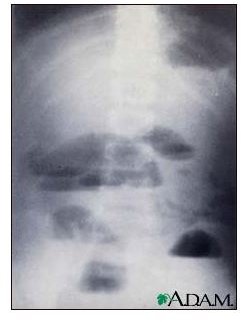Learn about Small Intestinal Blockage Complication
What is a Small Intestinal Blockage?
Small intestinal blockage or intestinal obstruction or small bowel obstruction (SBO) is a condition in which small intestine is moderately or completely obstructed. This obstruction or blockage keeps food, fluids, and gas from passing through the intestine resulting in serious pain. If this occurs, the condition might lead to a small intestinal blockage complication, which in turn will cause dangerous effects such as dehydration and renal failure if untreated.
Causes
Humans have the small intestine and the large intestine. The intestines are vulnerable to suffer from intestinal blockage, which is initiated by some conditions. Mechanical obstruction may include:
Hernia
Hernia is a situation in which the inside layers of the abdominal wall bulge and push through another part of your body, making a balloon-like sac. It will make a loop of intestine slip into the sac, leading to severe pain and resulting in this condition.
Tumor
Tumor is an abnormal mass of tissue, which can be malignant or benign. Food, fluids, and gas cannot go through smoothly if you have a tumor in your small intestine.
Intestinal adhesions
The abdominal cavity may contain some fibrous tissues that are considered as congenital tissues. However, intestinal adhesions or scar tissue can be present after abdominal surgery, which may block food, fluids, and gas in your intestine.
Paralytic ileus
Paralytic ileus or pseudo-obstruction is a situation in which the bowel does not work well. When you have a paralytic ileus, you might have the similar signs and symptoms like mechanical blockage, but there is no blockage. Abdominal surgery, lung and kidney disease can lead to paralytic ileus.
Signs and Symptoms
This condition includes some signs and symptoms such as nausea, diarrhea, fever, abdominal tenderness, vomiting, breath odor, and abdominal cramp.
Complication
It is very hazardous to your health, causing complication if untreated. When this occurs as a complication it can reduce the function of your intestine to absorb food and fluids you have consumed. This condition can lead to dehydration, vomiting, or shock, resulting in renal failure.
Interruption of the blood supply to the part of your small intestine is another effect of this complication. Keep in mind blood deficiency will allow the intestinal wall to stop working. If it happens, a perforation (hole or tear) in the small intestine might occur, resulting in a fatal infection known as peritonitis.
Peritonitis refers to an inflammation of the tissue lining the wall of the abdomen and abdominal organs. This dangerous condition has symptoms like nausea, fever, shivering, thirst, abdominal pain, abdominal swelling, failure to pass gas, and infrequent urination.
When you suffer from peritonitis, you might have a shock that includes the signs and symptoms such as a weak and rapid heartbeat, pale skin, lackluster eyes, and dilated pupils in the eyes.
Diagnosis
You must be aware of the fact that you have a swollen or tender abdomen, and when this occurs it’s important to see your doctor. A lump in your abdomen can also signify the complication.
Several tests like abdominal X-ray, computerized tomography (CT) scan, and ultrasound scan can diagnose whether you have a mechanical blockage or palalytic ileus.
Resources
MayoClinic.com: Intestinal Obstruction - https://www.mayoclinic.com/health/intestinal-obstruction/DS00823
Wrong Diagnosis: Complication of Bowel Obstruction - https://www.wrongdiagnosis.com/b/bowel_obstruction/complic.htm
Emedicine: Obstruction, Small Bowel - https://emedicine.medscape.com/article/774140-overview
Photo Credit
Image courtesy of the National Library of Medicine.
Disclaimer
Please read this disclaimer regarding the information contained within this article.
